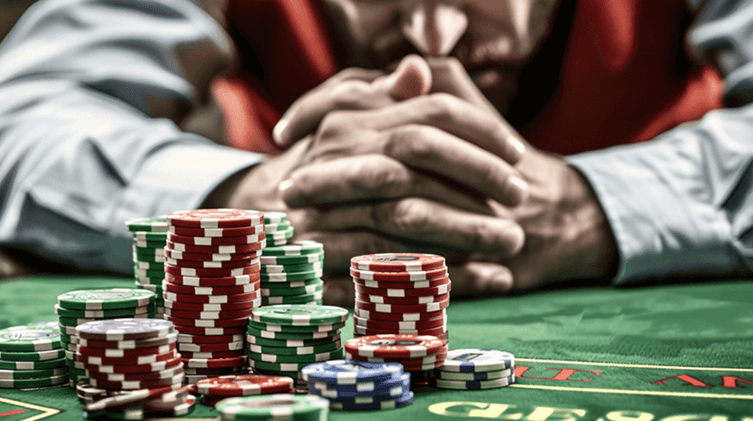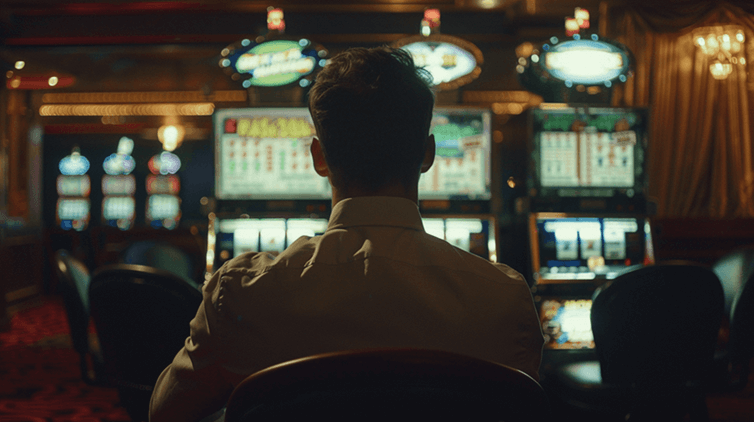
Gambling can be a pastime you do sometimes for fun, but if you lose control over your spending and time, it can quickly turn into a severe problem. Here, we will outline how first to spot and then deal with compulsive behaviors related to gambling, known as ludopathy.
What is ludopathy?
Ludopathy is pathological gambling, also known as gambling addiction or compulsive gambling, a psychological disorder characterized by the inability to resist the urge to gamble. A compulsive gambler is unable to control his gambling behavior and spending, which leads to severe personal and problematic consequences. Usually, because of it, people’s finances and personal relationships suffer the most.
Medical studies have highlighted the psychological traits that characterize ludopathy, namely impulsivity, sensation seeking, and a tendency toward risky behavior. These individuals may experience more thrill or excitement when they gamble, leading them to continue despite the negative consequences. The consequences of gambling addiction can be serious and extensive: money difficulties, relationship problems, legal discomfort, and even mental health conditions such as depression and anxiety.
It is critical to intervene from the earliest signs of problems related to on-site and online gambling addiction. There are differences in the types of gambling preferred and the prevalence of the disease by age and gender. The disease is more common among adolescents and young adults. Men are often more likely to develop it than women. Young people prefer sports betting, while adults and older people are more prone to slot machine and bingo addictions.

The first thing to pay attention to is how to notice that you have a problem. Here are some clear indicators.
The American Psychiatric Association lists the following symptoms and signs of gambling addiction:
- You feel a thrill when you gamble
- You are prone to taking more risks
- You have an increased desire for gambling
- You are often reliving and fantasizing about gambling experiences
- You are using gambling to escape your negative emotions
- You are feeling guilty or remorseful after gambling
- You need financial support
- You have had unsuccessful past attempts to stop gambling
Overall, the above are the symptoms we experience in almost every kind of addiction. There are a few other signs that reveal you need professional help with gambling addiction. Do you lie about your time spent playing games of chance or betting in the casino or online? Do you borrow or steal money to keep your habit?
Why do we develop compulsive gambling?
Several causes and risk factors are associated with developing gambling addiction. These include genetic factors, environmental influences, and underlying mental health conditions such as depression or anxiety. In addition, social and cultural factors, such as exposure to gambling at a young age or living in a community where gambling is widely accepted, may contribute to the development of compulsive gambling. It is essential to understand these factors to identify individuals at increased risk of developing ludopathy.
Thankfully, not all people who gamble develop pathological addictions. Since there are specific individual differences within different populations, some are more susceptible to developing gambling addiction than others. Many different personal and environmental factors play a role here. The former could be traced to increased vulnerability to gambling disorders, including neuropathology and certain character features.
In fact, plenty of studies have found that the disease is mainly caused by specific neurobiological changes that are the effects of play. The neurotransmitters that play the major roles here are higher levels of serotonin (responsible for impulsive behavior), norepinephrine (responsible for intense desire for sensation), and dopamine (responsible for rewarding behavior). We all struggle with keeping these neurotransmitters in balance, which can cause all kinds of addictions and unhealthy behaviors.
How to get out of gambling addiction?
The pathway out of pathological gambling requires a complex approach that may involve applying several tactics. These include psychological support to help you relate thoughts and feelings, understand the underlying causes of addiction symptoms, and develop strategies to manage and overcome addiction. Interventions and a psychotherapeutic course can help pathological gamblers in many ways to cope with ludopathy and also in admitting their condition and realizing they have a problem (the first step to healing).
Therapy, on the other hand, can help find the underlying reasons and problems that contribute to developing gambling addiction in the first place. Psychotherapy can also help individuals develop coping strategies to manage the strength of their urge to wager uncontrollably.
Now that you know how to understand if you have a severe problem, here are some tips on how to overcome betting addiction. Apply them daily to help overcome gambling dependence. The first step to solving this problem is acknowledging that you have a gambling addiction, which is a serious issue.
Find what triggers you
So, you want to know how to overcome gambling? One thing you can do is find what triggers your compulsive behavior. Stressors may be thoughts, feelings, situations, or behavior patterns that urge you to gamble. For example, if you hang out with friends with the same problem or who use alcohol, you are more likely to fall into the same path. Drinking lowers our inhibitions, making us risk more.
It has been proven that people with gambling problems are more likely to develop a substance use disorder. Having a journal and keeping a record of your time, money spent gambling, and the environment and happenings around it, including your thoughts and feelings, is good practice. Journalling will help you recognize your compulsive gambling triggers more easily.
Plan your daily routine ahead
Ex-gamblers reveal their struggle with periods of boredom, being very much used to the highs and lows of their addiction. Research backs this, showing that problem gamblers have a low boredom threshold. When they deal with an unexciting task, they either avoid it or do not complete it.
Do you want to know how to overcome betting addiction? One way is to plan your schedule so that you don’t have any empty time space you may be tempted to spend gambling. Planning will also make you more organized and responsible, making your time more efficient.
Stop believing in illusions

Gamblers tend to have negative habits, namely the illusion of control, superstitious beliefs, and the gambler’s fallacy. These thought patterns are very unhealthy and can increase compulsive gambling. If you reduce them by finding and changing them, you’ll be one step further to solving the problem.
So, what are these beliefs:
- Gambler’s fallacy: not understanding the independence of chance events, instead believing you can predict what will happen based on what has happened before. For example, a gambler may assume that the chances of losing a game are lower if they have just had a losing round. The odds, however, remain the same.
- Superstitious thinking: Such beliefs are also common among people who play online casino games for real money and participate in sports betting. They might think that random occurrences have special meaning and count on them. For example, if you love roulette, you might choose the exact numbers you believe are lucky for you and often or always place your money on them. Remember that superstitious thinking comes from coincidence, and luck has nothing to do with it.
- The illusion of control: The false belief that you can control the result of casino games is typical for problematic gamblers. To prevent this thought system, remember that no technique or trick can influence what happens. Be it if you’re gambling online, playing cards in a bar, betting on a sports game on the internet, in a kiosk, or sitting at a slot machine at a casino venue. Each bet or decision is random, and the results are out of your control.
Revive old hobbies and find new ones
Addicted to gambling, individuals inevitably lose interest in the activities they used to practice and love in the past. If this happens, you must reevaluate your hobbies, which ones you love, and which others you can add. If these are healthy activities like meditation, sports, jogging, mountain climbing, trekking, dancing, singing, and the like, they will bring countless positives to your life. One is your improved health and uplifted mood, which can help you quickly stop this bad habit.
Find healthy substitutions
Research has found that gamblers tend to have difficulties with impulse control and with delaying gratification. Gambling makes it even worse, gradually changing your reward system. As a result, you might have trouble occupying your mind after you stop practicing it. One solution is to replace problem gambling with alternatives as stimulating as playing games of chance.
What you can try:
- Mindfulness: Deep breathing exercises and meditation are proven effective in slowing down and changing our thoughts to the present moment. By living in the present, you can be aware of unhealthy thought patterns and release all the accumulated stress that makes you want to gamble.
- Art therapy, whether music, drawing, painting, or participating in any creative endeavor to focus your mind on something rewarding, is paramount. Studies have shown that therapeutic art boosts mental health and thus can help you overcome problematic gambling.
- Exercise: many studies have reported regular exercise’sphysical and mental health benefits. Staying physically active is especially important when you have a substance use disorder or gambling addiction. Exercises do not need to be very strenuous. A daily walk, lifting weights, riding your bike, or any physical activity you like that distracts you from gambling should be done.
- Volunteering: Studies reveal that volunteering makes us happier and more helpful to others. Reducing stress and depression triggers is vital for overcoming addiction. You can volunteer anywhere you feel attracted to or involved, whether in your local hospital, agricultural or other organization, animal shelter, etc.
Even some extreme sports that include the rush of adrenaline can help you find a new favorite activity you can use to substitute uncontrolled gambling. Finding a healthy substitute is one of the most common ways people with addictions cope with them.
Use responsible gambling tools, organizations, centers, and websites
Every respectable gambling website includes responsible gambling pages and self-prevention tools to limit and control players’ gambling activities. U Use them to plan how much you are comfortable spending and what you can do to diminish the risk of overspending and losing control.
If you want to learn how to overcome gambling losses, use the services of the following organizations devoted to helping people with compulsive behavior:
- National Council of Problem Gambling (NCPG)
- Gamblers Anonymous
- American Addiction Centers
- 800-Gambler
- Substance Abuse and Mental Health Services Administration (SAMHSA)
- State government pages - State regulators who license gambling often include pages dedicated to responsible gambling, such as the NJDGE (New Jersey) and the MGCB (Michigan). Your state’s government website may have more tools available for you to use.
Get professional help with compulsive gambling
Overcoming gambling can be difficult and take time, depending on how long you have had this problem. If none of the abovementioned tips work for you, you must consult professionals. Here are the main steps: try one at a time and add more if necessary.
Seek professional help with compulsive gambling by testing any of these options:
- Therapy: Behavioral therapy and cognitive behavioral therapy have proven to be helpful with gambling issues. Behavioral therapy involves exposure to the behavior you want to stop, teaching you the specific skills to reduce your gambling urges. Cognitive behavioral therapy’s focus, on the other hand, is on finding any unhealthy, negative, and irrational beliefs and replacing them with healthy, positive ones. Another way is getting family therapy.
- Medications: Antidepressants and mood stabilizers may help treat problems related to compulsive gambling, such as depression, anxiety, or bipolar disorder. Some antidepressants may reduce gambling behavior, while the medications called narcotic antagonists are helpful in the treatment of substance misuse as well as compulsive gambling. However, remember that medications usually suppress the symptoms and do not cure the problem’s underlying cause. So, psychotherapy may be more useful here or applied simultaneously with other treatments.
- Join self-help groups: Many find communicating and bonding with others with the same problem an efficient part of treatment. Being part of a group will support you emotionally on your journey. Sharing ideas and tricks, what works and what doesn’t, may be invaluable. Ask your health care or mental health provider for suitable self-help groups, such as Gamblers Anonymous and other resources.
Overall, the first step to dealing with any addiction or issue, including gambling, is accepting that you have a problem. Once you acknowledge your compulsive behavior, you can take other steps toward healing.
Besides the tricks presented above, you can reward yourself in a way you decide every time you resist the urge to gamble more than planned. You can even create a reward system, setting aside money to collect and spend later on something you long for some time, like a holiday or a luxurious purchase. This will keep you motivated, and you will be less likely to overspend.
Finding how to cope with stress is another potent weapon, as most problems and addictions we have are caused by stress. Preparation for those challenging moments and understanding the reason you gamble without control in the first place are essential for your treatment success. Use counseling and professionals if needed to solve the problem effectively.